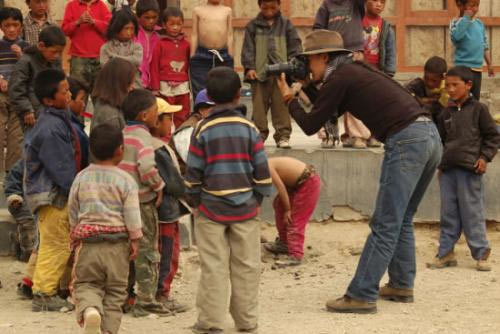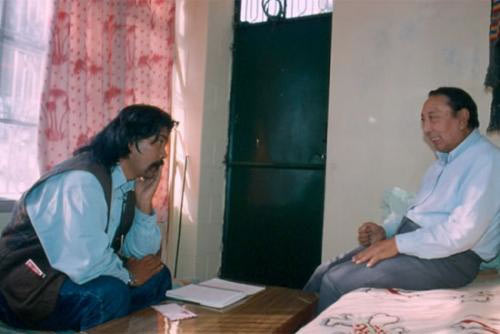Washington, DC: An environmental project to protect endangered species, the publication of a science vocabulary book for children and an in-depth investigation of Tibetan maps are among 11 projects chosen by ICT’s Rowell Fund to receive grants in 2008. The Rowell Fund Board will award over $57,000 this year to applicants in 5 countries in memory of explorers and photographers Galen and Barbara Rowell, prominent supporters of Tibet who died in a plane crash in 2002.
The 11 projects selected this year came from a strong pool of over 50 proposals based mainly in South Asia.
“The growth of The Rowell Fund for Tibet since it’s inception has been very exciting to watch, demonstrating support the world over for the Tibetan culture and homeland,” said Rowell Fund Advisory Board member John Jancik, who added that the quality of applications this year to The Rowell Fund was the most impressive since the beginning of the fund five years ago.
As avid mountaineers and outdoor photographers, Galen and Barbara Rowell helped bring Tibet and the Himalayas into the public eye, and their fund continues this legacy, providing small grants to Tibetan writers, academics, relief workers and conservationists. To learn more about Galen and Barbara Rowell and the background of the Rowell Fund, click here.
Grants ranging from $1,500 to $7,500 have now been allocated to projects including oral histories of Tibetan women and elders, eco-tourism, an art program for newly arrived Tibetan refugees, two photography projects, and a study of new and old Tibetan maps. Four of these 11 grants went to projects led by women, in an effort to promote their leadership within the Tibetan community.
The 10 advisors of the Rowell Fund, all friends or family of Galen and Barbara, each received copies of the 55 proposals. After review, discussion, and a democratic voting process, the top proposals were selected. The advisory board consists of John Ackerly, Conrad Anker, Justin Black, David Breashears, Jimmy Chin, Bob and Beth Cushman, John Jancik and Terri Baker, Bob Palais, Tony Rowell and Ray and Nicole Rowell Ryan. To learn more about the Board of Advisors and the grant process, click here.
Much of this year’s grant money came from John Jancik and Terri Baker’s 50 for Tibet fundraising initiative, in which the Jancik-Baker family and friends secured sponsorships to climb the highest peak in each US state.
Jancik said: “To have raised more than $150,000 for this cause to help Tibetans who are working to promote their culture and preserve the environment is something that the entire 50 For Tibet fundraising Team HighPoint is proud of .”
ICT and the Rowell Fund also wishes to congratulate last year’s grant recipients, whose final written reports provided concrete evidence of impact the Rowell Fund continues to have among Tibetan communities.
The Fund is managed by the International Campaign for Tibet.
This year’s grantees and their projects include:
- Tsering Yangkey ($7,500): The project follows up on environmental awareness education initiated in Tibetan schools by TEAM (Tesi Environmental Awareness Movement) in 2006.
- Sonam Tashi ($7,358): This project documents the oral histories of the Nangma and Thoeshey musical genres, which center upon “the women inside the house.”
- Lhamo ($3,940): This is the third year that that Rowell Fund will support the Art Refuge project, which provides art classes and art therapy to newly arrived Tibetan refugee children.
- Tenzin Tsepak ($3,800): The Oral History Department of the Library of Tibetan Works and Archives plans to use the grant in order to publish three accounts of Tibetan history both in Tibet and in exile.
- Tsering Wangmo ($1,500): This project aims to create a book of poetry based on the stories of Tibetan nomads in the Dhompa region.
- Tenzing Paljor ($1,500): This is the second year that the Rowell Fund will support the photography project documenting the “Vanishing Himalayas.”

Tenzing Paljor photographs young school age Tibetans for his “Vanishing Himalayas” project documenting the culture and environment of the Himalayan regions bordering Tibet.

Grant recipient Sonam Tashi interviewing the recently deceased, Maja Tsewang Gyurme-la, for his oral history project.

